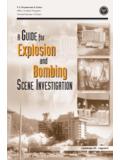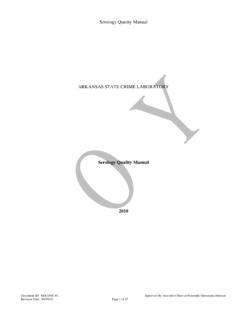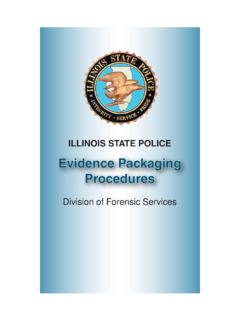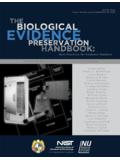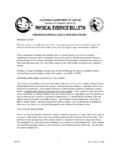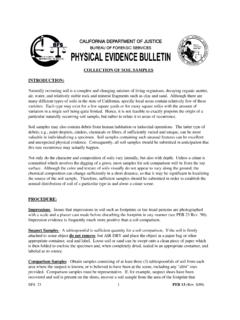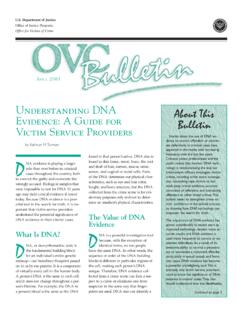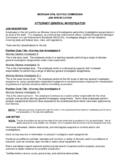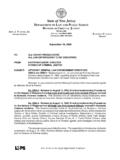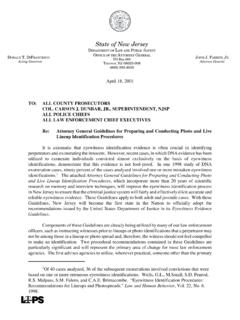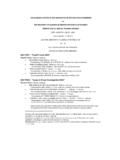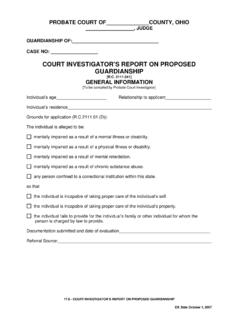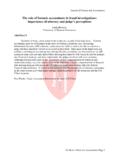Transcription of Forensic Science in Canada
1 0 Forensic Science in Canada A Report of Multidisciplinary Discussion May 4 5, 2012 Forensic Science in Canada is at a critical juncture. Both public and judicial confidence in our practices have been eroded by several high-profile inquiries into the damage wrought by faulty Forensic evidence. We have learned that reliable Forensic Science is a cornerstone of any effective justice system. However, in the past few years, there have been considerable improvements, much to the benefit of the public. In this report, Forensic experts from across Canada describe the current state-of-the-art in Forensic Science and make recommendations to improve services. The unanimous conclusion is that the Forensic sciences must grow and develop in Canada to enhance public health, public safety and justice.
2 Continuous and sustainable improvement in all the disciplines of Forensic sciences will require the coordinated efforts of academic institutions, government, stakeholders in the justice sector, and Forensic scientists. Edited by Michael S. Pollanen Matthew J. Bowes Sherah L. VanLaerhoven Joanne Wallace 2013 1 Forward Honourable Justice Marc Rosenberg Ontario Court of Appeal Reliable Forensic evidence, reported accurately and presented with clarity and honesty in court and with limitations clearly expressed, can be essential for the correct resolution of many criminal and civil cases. Beginning in the 1990s several developments have affected the use of expert Forensic Science evidence.
3 In its 1994 decision, R. v. Mohan, [1994] 2 9, the Supreme Court of Canada commented on the risks associated with expert Forensic evidence: There is a danger that expert evidence will be misused and will distort the fact-finding process. Dressed up in scientific language which the jury does not easily understand and submitted through a witness of impressive antecedents, this evidence is apt to be accepted by the jury as being virtually infallible and as having more weight than it deserves. In that and other decisions, the courts were assigned a greater role as gatekeepers charged with admitting into evidence only reliable expert evidence necessary for the correct resolution of the case.
4 This development subjected Forensic sciences to increased scrutiny by lawyers and judges. Since then, the legal community has struggled to understand what the experts are telling us and to ensure that fact-finding is not distorted by junk Science , by clinical experience presented as Forensic Science , or Forensic Science inaccurately presented. At the same time, public inquiries began to identify shortcomings in the gathering of Forensic evidence and problems with the way it was presented in court. Tentative findings, or those open to many interpretations, were presented in misleading terms suggesting greater certainty than the scientific results could justify. Similar doubts were raised about Forensic sciences in other common law countries, especially the United states , with the 2009 publication of: Strengthening Forensic Science in the United states : A Path Forward.
5 This report, produced by the National Academy of sciences , painted a bleak picture of the state of Forensic sciences in the United states and cast doubt on the reliability of evidence coming from experts working in long-established Forensic sciences . Forward 2 The multidisciplinary discussion and this report on the state of Forensic Science in Canada represent important steps in building confidence in Canada s Forensic Science sector. As Dr. Pollanen has observed, Forensic sciences are at a critical juncture. The material included in this report paints a more optimistic picture for Canada than that which exists in the United states , primarily because, unlike in the United states , much of Canada s Forensic Science is done in a few centres of excellence.
6 But this report also reveals important areas for improvement, if confidence in Forensic sciences is to be restored and maintained. There is an urgent need for greater investment in research, training and graduate education. The demands on scientists, to provide reports and evidence, often leave little time for research and continuing education. In her discussion of Forensic entomology, Dr. VanLaerhoven voices a concern that may be generalized to most of the Forensic sciences : a chronic lack of funding is a major barrier to developing the discipline and training new experts. The Forensic sciences would also benefit from greater integration with the broader scientific community and closer association with universities, as is the case in Ontario for Forensic pathology and Forensic entomology.
7 This report also identifies other shortcomings in the Forensic sciences in this country. Some important disciplines, like Forensic odontology, have no national standards and rely upon training and accreditation from other countries. Important disciplines, such as Forensic nursing, suffer from a lack of consistent legislative and regulatory framework and limited opportunities for research. Thus, while this report contains many positive elements, it also highlights weaknesses and concerns that must be addressed. As the Driskell1, Morin2, and Goudge3 inquiries show, we ignore the state of Forensic sciences at our peril. 1 Commission of Inquiry Into Certain Aspects of the Trial and Conviction of James Driskell, The Honourable Patrick LeSage, Commissioner.
8 2 Commission of Inquiry into Proceedings Involving Guy Paul Morin, The Honourable Fred Kaufman, Commissioner. 3 Inquiry into Pediatric Forensic Pathology in Ontario, Mr. Justice Stephen T. Goudge, Commissioner. 3 Preface Michael Pollanen BSc MD PhD FRCPath DMJ (Path) FRCPC Founder, Forensic Pathology Director, Centre for Forensic Science and Medicine Department of Laboratory Medicine and Pathobiology, Faulty of Medicine University of Toronto The Centre for Forensic Science and Medicine (CFSM) at the University of Toronto is pleased to coordinate and host the first multidisciplinary discussion of Forensic Science in Canada . This discussion has involved key Forensic scientists from across the country who have come together in a collaborative forum to describe the current state of Forensic Science in Canada .
9 Most importantly, this valuable discussion has identified unifying themes, conclusions and recommendations to strengthen and advance Canada s Forensic Science sector. Forensic Science in Canada is at a critical juncture. Both public and judicial confidence in our practice have been eroded by several high-profile inquiries into damage wrought by faulty Forensic evidence, and must be rebuilt. Furthermore, members of the Forensic Science community are themselves demanding better scientific practices and an increased emphasis on building academic foundations for Forensic work. All of these issues can be addressed by the collaborative efforts of Forensic practitioners and academic Forensic scientists.
10 It is our hope that this report will be a catalyst for further activities sponsored by the CFSM and other organizations, including universities, community colleges and institutions. It is now time to develop a national strategic plan for Forensic Science in Canada . Preface 4 R. v. Mullins-Johnson, 2007 ONCA 720 .. fresh together with the other evidence, shows beyond question that the appellant s conviction was wrong and that he was the subject of a terrible miscarriage of justice. We conclude these reasons by paraphrasing what the president of the panel said to Mr. Mullins-Johnson at the conclusion of the oral argument after entering the verdict of acquittal: it is profoundly regrettable that as a result of what has been shown to be flawed pathological evidence Mr.

